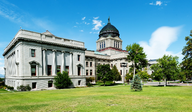
Democrats now call tax increases ‘revenue enhancers.’
A big reason for this is that they don’t want to be seen as raising taxes.
So we have a little semantical wordplay.
It’s smart…from their perspective. They know that after voting for temporary tax increases in the January 1992 special session, they lost big.
In fact, the Dems lost the House later that year and they lost the Senate two years later, in 1994.
Dems really shot themselves in the foot back in ’92.
They had the legislature, with majorities in both chambers. They also had a Havre Republican serving as governor.
That was Stan Stephens, someone we’ve profiled before.
Anyways, Stephens called the session even though he knew he didn’t have enough GOP votes to get his way.
And sure enough, the Dems took what was supposed to be a short session to cut budgets and instead raised taxes, er…enacted ‘revenue enhancers.’
Taxes went up by 7% across the board.
No Republicans voted for it, but they didn’t need to – Dems had the majorities and Stephens let the tax increases pass without his signature.
He also had a stroke a day after the 12-day special session left town. That ended his political career and opened the door for Rehberg to anoint Racicot.
Not even a year into his first term, Racicot called a “clunker of a special session” in November and December 1993 to try and fix the property tax mess.
The session lasted 18 days, and was called a “sideshow.” Chuck Johnson described it as a real mess that ended on a Saturday night, “a week before Christmas,” and the “high-drama, verbal showdown between the presiding leaders of each chamber fizzled and led to naught.”
Some of those legislators were likely around back in 1986 for the “Easter Massacre” special session, a 6-day affair that “began without consensus and ended ingloriously as the sun rose early Easter morning after a shouting match between legislative leaders of the two parties.”
Both of those screw-up-sessions likely had legislators pining for the 1-day affairs, like we saw in 1975 to fix the 6-mill university levy or in 1985 to fix vehicle fees.
Governor Toole also had a 1-day special session, on May 26, 1903, for a Louisiana Purchase Exposition. That December Anaconda Copper forced him to call another. It lasted 11 days so the corporation could have its way.
Judy Martz had a ‘one-dayer’ as well – September 13, 2002, to amend HB 2 to go into effect immediately.
Schweitzer followed the same formula on December 14, 2005, for a special session to fund schools via SB 152. He did the same on September 5, 2007, to fund that summer’s disastrous fire season.
Some special sessions are quite long, too.
Back in 1933, Governor Cooney called a special session that lasted from November 27 of that year until January 19, 1934. Big issues were federal programs to combat the Depression.
Cooney wanted to mobilize relief funds but was nearly impeached for earlier decisions he’d made to divert federal funds from the liquor board to a water compact (the secretary of state was also impeached).
It was actually a close vote, but Cooney managed to hang on. The stress must have been enormous, and in the end his body just couldn’t take it. He was dead 18 months later, just two years into his term.
Governor Forrest Anderson had a long one in 1971, from March 8 to April 3 to solve long-range building problems, and kick around a sales tax idea. Neither he nor legislators got the job done, and Anderson had to call another special session that same year, from June 7 to June 25.
Many times the special sessions are simply a waste of time and money. Governor Sam Stewart found this out in 1919.
The economic depression of 1918-22 was hard in Montana, with 2 million acres going out of farm production and 11,000 farms abandoned, 20% of all in the state.
The Campbell System that’d grown up and convinced so many that dry-farming was a viable option in Montana was now a dirty word. Demands for a special session were heard as well as direct congressional action from Montana’s two senators.
By 1919 there were 3,000 destitute farmers in Hill County, all without a penny in their pocket and an ounce of hope in their souls. They’d been beaten, and badly. Montana had had its way with them, and they knew it. Governor Stewart called a special session for that July.
What could have been a demonstration in leadership against overwhelming odds instead turned into a joke. Most of the 13-day affair was spent arguing about the weather and what could be done about it.
Their answer was to grant county commissioners the authority to issue road-building bonds. The idea was to put homeless farmers to work doing something, but no one bought the bonds and few new roads were built. The crisis went on.
Governor Dixon’s 17-day special session in March 1921 was also a flop. Sure, he got an inheritance tax, new oil taxes, and funding for schools, but Anaconda Copper was so incensed with him over this that they closed down all their Montana operations for nine months.
This effectively ended Joe Dixon’s political career.
Sometimes the legislature itself calls for a special session, as they’ve done just one time before, on March 12, 1973, to finish the work they couldn’t get done in the regular session.
We now have Democrats in Montana calling for a special session to deal with the budget cuts seen in the 2017 legislature.
“Being in the minority in both chambers,” political writer George Ochenski tells us, “could very well backfire on the Democrats.”
Ochenski wonders if minority Democrats know what they’re getting into.
“Perhaps it’s a sign of the loss of legislative institutional knowledge and inexperience due to term limits,” he ponders, citing safe-in-the-city Democrat Jenny Eck, and legislators like her “simply don’t understand what can happen if one is actually called – and the dangers are many, especially for the minority party.”
Why is this?
Because “neither the governor nor the minority Democrats have the power or votes to limit the session to revenue enhancing bills.”
Ah, yes…how a special session can get away from you.
Look what happened to Stephens in ’92 – thought he was calling a special session to cut the budget, instead he ends up raising taxes by 7%.
And the Democrats got blamed for that and haven’t had a majority in both houses since 1994, perhaps in large part because of their actions during that special session.
Montanans have long memories. They can hold a grudge.
Ochenski concludes that Democrats “are asking for more trouble than they know,” for the main reason that “they don’t have the votes to control the agenda, let alone the outcome.”
Mostly, it could “backfire horrendously on the very priorities they hold dear.”
You’ve seen Dems foaming at the mouth for weeks if not months now, all because state revenues are down and state workers and/or sick and disabled and drug-addled people won’t get state funds or support.
Imagine how much more they’ll foam if we don’t give them the tax increases they want, and actually cut the budget (and jobs and services) more?
And imagine what good that foaming will do for them.
Most lives will continue as normal, and Dems could garner even more blame for a situation that hurts their base more than anyone else’s.
Things like that cause Democratic voters to stay home come the next election.
Notes
Johnson, Charles S. “Special sessions can vary.” Helena IR. 8 May 2000. Web. Retrieved 2 October 2017. http://helenair.com/news/state-and-regional/special-sessions-can-vary/article_02339b45-8323-5cdb-9683-b7fdd3f9fdaf.html
Ochenski, George. “Special session could backfire on Democrats.” Missoulian. 2 October 2017. Web. Retrieved 2 October 2017. http://missoulian.com/opinion/columnists/special-session-could-backfire-on-democrats/article_13b9178a-ec09-58f3-b4ca-78d4136b68f1.html
“Proceeding with Caution.” Logicosity. 2 October 2017. Web. Retrieved 2 October 2017. http://www.logicosity.com/2017/10/proceeding-with-caution.html
“Special Sessions 1889 – Present.” The Montana Legislature. Web. 4 March 2009. Retrieved 2 October 2017. http://leg.mt.gov/css/About-the-Legislature/Facts-and-Statistics/special-sessions.asp

